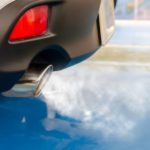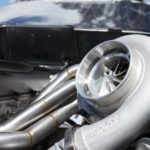Quick Navigation
Have you noticed an odor of burning oil in your car recently? Probably your car engine is already burning oil.

Oil allows your car engine to function correctly by giving lubrication, coolant, and cleaning properties that your car needs. But if it enters the combustion chamber due to a faulty engine, it will burn the oil instead.
Burning oil in your car engine can cause damage to your car later on. If you are looking for an answer to why your car is burning oil, you’ve found the right place. We will discuss the causes and solutions in this article.
Reasons Why Your Car Is Burning Oil
Here are the reasons why your car is burning oil:
1. Oil Leakage
If your car is running fine, but you smell burning oil, it may be due to the oil leakage somewhere in your engine. Check your oil level; small leaks happen if it is less than the average.
Signs showing that your car has oil leaks when it has sluggish performance, dashboard warning lights, and oil puddles seen under your car.
If you encounter the same problem, have your vehicle checked by professional technicians, they can identify better if it’s a small or big leak.
2. Damaged Valves Seals
Valves work properly due to the oil; in your engine, there are two main valves, the intake and exhaust valves.
The intake valve will suck air and fuel into your car’s cylinders making your engine work. At the same time, the exhaust valve will remove what the intake valve left and exhaust it.
However, if they are damaged, the oil can penetrate the combustion chamber and burn it causing a burning smell and blue smoke.
3. Damaged Piston Rings
When the piston rings have been worn out, oil can enter the combustion chamber.
It will also form a carbon deposit in the cylinders and piston rings aside from burning the oil. The oil level will start to drop then.
4. Defective Oil Pan
If there is a damaged oil pan in your car it will make the oil leak faster. It gets damaged when driving on an uneven surface or getting hit by road debris.
Check your oil pan, especially if you see an oil puddle near your car. Oil leaks will cause oil to burn once it enters the combustion chamber.
5. Worn-out Gasket
The gasket’s function is to prevent oil from spilling on the other parts of the engine. If it gets worn out, it will cause oil leakage, and oil levels will drop from the level they should be.
The cause of the gasket being worn out is because of the continuous heating up and cooling over time, so replacement is needed when it happens.
6. A Clogged Crankcase Ventilation
If the crankcase ventilation or the PVC valve is clogged, it will create overpressure and push the oil outside the motor through the seals.
Check the crankcase ventilation hoses and the PVC valve and ensure the air can move freely from the engine to avoid oil leaks.
7. Using the Wrong Oil
Use oil that can withstand the engine’s heat, and follow your car manufacturer’s recommendations. Some engines generate too much heat; using the wrong oil will likely burn rapidly.
Also, change your oil regularly; if it is already old and dirty, it will not lubricate your engine correctly. Make sure that the color is tan or yellow instead of dark brown.
8. Too Much Oil Pressure
The high oil pressure will create excess fluids in the engine, and when it falls to the cylinders, it will burn the oil.
Find out what is causing the oil pressure, or maybe you have overloaded oil on your last service.
9. Old Engine
The engine works well when it is not old; during the first five years, it should not consume excessive oil and doesn’t burn it.
But when it gets old, the seals and gaskets will deteriorate. It will create leaks over time and burn the oil.
Signs Of Burning Oil
To determine if your car is burning oil, here are some obvious signs:
- The engine oil light is on.
- The smell of burning oil.
- Bluish smoke from the exhaust.
- Low coolant level.
- Engine overheating.
- There’s oil in the spark plug.
Things You Should Do When Your Car Is Burning Oil
When you notice that your car starts burning oil, try to assess the situation by following these guides:
Check the oil light: If the oil level is less than it should be, consider topping. When the oil decreases, have your car checked by professional technicians immediately, especially if it’s reoccurring.
Check oil level regularly: The oil level in your car should be precise to make your engine work smoothly. Check it regularly so you can refill it immediately when needed.
Check the spark plugs: If they look wet and oil, it is a sign of bad spark plugs. Determine what causes the oil burning; if it’s associated with spark plugs, replace it immediately.
Check your car engine: Always check how your car engine works. If your engine is overheating, it might be burning oil. Consult a professional mechanic to assess your car issues.
Check the exhaust: If your car exhaust releases bluish smoke, it strongly indicates burning oil. Please bring it to the mechanic shop to have a proper diagnosis.

Bring your car to the mechanic shop: If things are getting serious or signs appear, bring your vehicle to a professional mechanic for proper inspections. It will not just prevent any huge expenses but will also ensure your safety while driving.
How to Stop Burning Oil in Your Car’s Engine
Once you notice that your car is showing signs of burning oil, you must act on it immediately. Please pay attention to any signs and repair them right away to avoid more troubles in the future.
Here are some recommendations on how to fix or prevent burning oil in your car:
- Have proper car maintenance. Regular maintenance will prevent any troubles in your vehicle, such as burning oils.
- Use the right oil, and follow your car manufacturer’s manual for proper guidance.
- Replace worn-out gaskets and seals if you notice oil leaks immediately.
- If your engine is more than five years old, consider upgrading to a new one. The older the engine, the more likely it will create trouble or burn oils.
- Fix the damaged oil pan to avoid oil leaks.
- Try fixing the things that may cause engine overheating.
- Always ensure you top the right amount of oil, especially if your car consumes a lot during high performance.
- Fix or replace damaged ring pistons.
- Fix bad spark plugs.
Conclusion
When engine components brokes, it will start to cause problems such as burning oil. Using the wrong oil will also cause problems when it cannot withstand the engine’s heat.
Over time the gasket, valves, and seals will wear out, and regularly checking them will avoid future problems.
It is important to note all those signs of burning oil in your car to ensure your engine is in good condition.
If those signs appear, always consult a professional mechanic to immediately check and fix your vehicle. It will save you money and ensure your safety if you address the issues promptly.

With comprehensive experience in writing exceptional quality articles and blogs about cars and related stuff, Daniel is one of the finest bloggers and a hardcore car lover we have. He is an ASE certified technician with an across-the-board experience of 10 years in the industry. He could not help tinkering with anything he got his hands on from a young age, which led to his remarkable career in the automotive repair industry.
When he is not under any hood, you can find him on the water or in the woods to pursue his passion for hunting and fishing. He has been writing for multiple sectors and is a regular contributor to several publications.
He currently owns a Nissan 300ZX TT and a Pearl Yellow but plans to upgrade it to 550 HP. His favorites include the Koenigsegg CCX and Lamborghini Diablo 6.0 VT, but for him, the Ferrari 360 Spider is one of the sexiest cars that exists to date.
Being an avid world traveler, he has spent most of his time analyzing the automotive markets, latest technology, and local favorites to enhance his knowledge base. He is currently living in North Caroline, where it’s all about food and coffee and, of course, cars.







